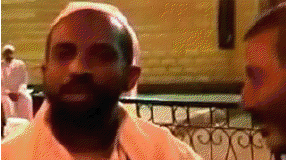|
Image may be NSFW. Clik here to view. 
|
| Muhammad Jamal al Kashef, a main suspect in the Benghazi consulate assault, from a video posted by the Al Marsad News Network. Courtesy of SITE Intelligence Group. |
The Egyptian government has arrested Muhammad Jamal al Kashef (a.k.a. Abu Ahmed), a senior terrorist tied to the Sept. 11, 2012 terrorist attack in Benghazi, Libya, according to The Wall Street Journal. Kashef has direct, longstanding connections to al Qaeda leader Ayman al Zawahiri.
Kashef served as an Egyptian Islamic Jihad (EIJ) terrorist in the 1990s and was imprisoned for years. The EIJ was headed by Zawahiri, who merged the group with Osama bin Laden's operation.
After his release from prison in 2011, Kashef established training camps in Egypt and Libya. Some of Kashef's trainees took part in the Benghazi attack, according to multiple published accounts.
The Wall Street Journal reports that Kashef "petitioned al Qaeda leader Ayman al Zawahiri to establish a new Qaeda affiliate he called al Qaeda in Egypt" and also received financing from al Qaeda in the Arabian Peninsula (AQAP). Al Hayat, a London-based Arabic newspaper, previously reported that Zawahiri gave Jamal the go-ahead to launch terrorist attacks in Egypt, Libya, and elsewhere.
On Oct. 24, Egyptian authorities raided an apartment in Nasr City, Cairo, arresting several terrorists in the process. A suspected terrorist was killed during the confrontation when one of his bombs detonated, setting the apartment building on fire.
The Nasr City terrorist cell has ties to Kashef and the attack in Benghazi, as well as al Qaeda's operations inside Libya, the Egyptians say.
Days after the Nasr City raid, the Egyptians arrested Sheikh Adel Shehato, an EIJ official who openly declares his adherence to al Qaeda's ideology. Shehato is accused of founding and financing the Nasr City cell. Shehato was reportedly arrested en route to Libya with a large sum of cash.
It was the Egyptians' investigation of the Nasr City cell, with help from American counterterrorism officials, that led to Kashef's arrest.
Shehato was one of several al Qaeda-linked jihadists who helped instigate the Sept. 11 protest in Cairo. EIJ leaders Mohammed al Zawahiri, who is the younger brother of al Qaeda's leader, and Sheikh Tawfiq al Afani incited protesters as well. Kashef has long known the younger Zawahiri and al Afani.
The Wall Street Journal previously reported that Mohammed al Zawahiri helped Kashef contact his brother after their release from prison.
In 2007, a prominent jihadist ideologue named Sayyid Imam al Sharif (also known as Dr. Fadl) published a critique of al Qaeda's approach to waging jihad. Sharif was Ayman al Zawahiri's comrade in arms for years, making his rebuke especially noteworthy.
Eight al Qaeda-linked jihadists imprisoned in Egypt at the time released a letter rebutting Sharif's critique. Kashef, Mohammed al Zawahiri, and al Afani were among them.
"We support all jihad movements in the world and see in them the hope of the nation and its frontlines toward its bright future," their statement read. "We say to our Muslim nation that no matter how long the night may last, dawn will emerge."
Another jihadist who signed the 2007 letter is Ahmed Ashush, who is the founder of Ansar al Sharia Egypt. Ashush does not hide his admiration for Ayman al Zawahiri, saying in a recent interview that he is "honored to be an extension of al Qaeda." Ashush has repeatedly praised and defended al Qaeda's leader. Al Qaeda has returned the favor by including numerous clips of Ashush in its propaganda videos.
Ashush published a fatwa on Sept. 16 calling for the makers of "Innocence of Muslims," an anti-Islam film, to be killed.
Kashef is, therefore, a significant link between the jihadists who incited protesters on the morning of Sept. 11 in Cairo and the terrorists who attacked the US Consulate in Benghazi later that same day.
(A version of this article was first published by The Weekly Standard.)